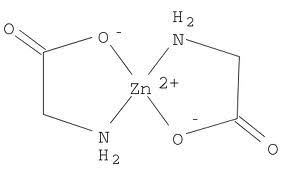InBio Zinc Bis-Glycinate
Zinc bis-glycinate is a well-tolerated and well-absorbed zinc form, which consists of one zinc molecule bound in a chelate to two molecules of the amino acid glycine (bis = two). Since zinc in this form is absorbed intact, it does not compete in the absorption in the intestinal tract of other minerals or trace elements.
Alterations in the immune response due to preexisting zinc deficiency increase susceptibility to infections, and zinc deficiency has been found in all kinds of diseases, although cause and consequences need to be more clearly defined. While a transient decrease in serum zinc during the APR appears to be necessary to activate proinflammatory immune cells and to mount an efficient immune response, normalization of zinc homeostasis seems to be essential for anti-inflammatory and antiredox reactions as well as for the recovery of immune cell numbers, including an increase in Treg cells. If serum hypozincemia is augmented or prolonged, severe consequences, including tissue damage and severe progression of inflammatory diseases, can be expected. Thus, even mild zinc deficiencies should be addressed, and supplementation should be considered for patients at risk of zinc deficiencies. This advice is strongly supported by positive results from supplementation studies, revealing great benefits regarding various infectious diseases, certain autoimmune conditions, allergies, and certain cancers.
Although we have seen great progress in understanding zinc’s role in the immune system, there are many open questions. Future research should focus on the development of a reliable biomarker for zinc status. Significant future challenges are to define zinc’s interaction more closely with other nutritional elements and to include that information in the development of efficient treatment strategies.
Summary and conclusuion from an article by Wessels et al. 2021 (1).
Combining iron succinate with zinc bis-glycinate can manage iron deficiency anemia while supporting immune function. Zinc works harmoniously with iron to ensure optimal red blood cell production and function. This combination is particularly beneficial for vulnerable populations like children, the elderly, and those with compromised immune systems. Since zinc bis-glycinate is well-absorbed and does not compete with other minerals, it complements iron succinate without interfering with its absorption, ensuring the body utilizes both minerals.
Astaxanthin’s antioxidant properties can complement zinc bis-glycinate’s immune-boosting effects. Together, they defend against oxidative stress, crucial for protecting cells from damage, supporting healthy aging, and enhancing skin health.
Reference
1. Wessels I, Fischer HJ, Rink L. Dietary and physiological effects of zinc on the immune system. Annu Rev Nutr 2021; 41: 133-175.
Company News
